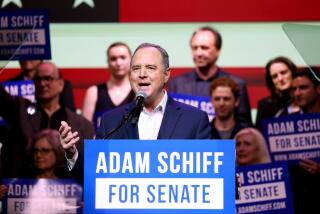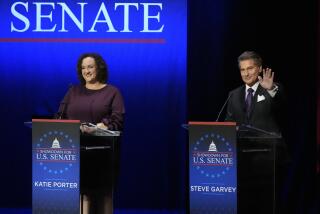Op-Ed: The political dilemma of our age: Confront or compromise?
State Senate President Kevin de León’s challenge to Sen. Dianne Feinstein compels California Democrats to confront a political conundrum of the Trump era: What values, strategic perspectives and legislative abilities should they seek in their own leaders? Which is more important: the inclination to confront or the inclination to compromise? Which is the more plausible and productive option in an age of polarization?
Feinstein and her supporters tout her ability to work across the aisle, to forge accords with Republicans when accords can be reached. Given the descent of the GOP into a far-right sect, however, such opportunities now come around about as often as a solar eclipse. On Tuesday, for instance, in the face of unified Democratic opposition, Senate Republicans passed a bill effectively banning depositors and credit card holders from suing their banks when those banks have defrauded them. (Through Wells Fargo-like practices, for instance.) That such absurd legislation could be supported by the GOP — even by such so-called moderates as Maine’s Susan Collins — with barely a murmur of misgivings illustrates just how detached from common decency the Grand Old Party has become.
The personification of that detachment, of course, is the president. Feinstein has expressed the hope that he’ll become a better president as he learns on the job, a belief that puts her at odds not only with most of her fellow Democrats but also with her Republican Senate colleagues Bob Corker, Jeff Flake and John McCain. Even if we take Feinstein’s statement as a momentary lapse of judgment, it is of a piece with her votes to confirm 11 of Trump’s Cabinet members and her continuing belief in the possibility of forging compromises with the GOP.
Feinstein comes by that belief honestly: Well-intentioned presidents, whatever their politics; a rudimentary commitment to racial equality; a Republican Party that gives credence to science or just empirically verified reality — these were the normal conditions of politics throughout much of Feinstein’s career.
De Leon is a bridge figure far better positioned to unite Democrats than Feinstein.
They’re not normal now. De León recognized that on the morning after Trump’s election, when he released a statement saying that California’s values were irrevocably opposed to Trump’s. He said Democrats would not and should not meet Trump halfway. Feinstein’s other prospective Democratic challengers — businessmen Tom Steyer and Joe Sanberg — have lined up with De Leon on this position. Indeed, Steyer has begun funding an effort to build support for Trump’s impeachment.
So how germane is Feinstein’s considerable experience and expertise in mastering a political order that has largely vanished? Is De León — and are Steyer and Sanberg — really the novices that some of Feinstein’s supporters have said they are?
The two wealthy businessmen, while lacking any legislative experience, have made sizable investments of time and funds in building progressive movements to retard climate change and promote greater economic equality — movements that have effectively become part of the “Resistance.”
De León, by contrast, can boast a record of legislative achievement that few current elected officials in state capitols or gridlocked Washington can claim. He wrote and steered to enactment the state’s signature alternative energy legislation and its sanctuary state statute. He persuaded his state Senate colleagues to pass the $15 minimum wage and a single-payer healthcare bill (which was shelved in the Assembly). He conceived and pushed to enactment a groundbreaking law that created retirement funds for workers in low-paying jobs. Half-a-dozen other states quickly adopted that idea before the Trump administration revoked the federal regulations that had allowed such laws to go into effect.
Feinstein’s longtime political consultant, Bill Carrick, attempting to dissuade Bernie Sanders enthusiasts from backing De León, noted that the state Senate president endorsed Hillary Clinton in last year’s presidential primaries. But Carrick’s contention actually highlights De León’s virtues more than his presumed detriments. He’s not only an accomplished political leader with longstanding ties to the party establishment, but also a true progressive who has effectively promoted key planks in Sanders’ platform. De León is a bridge figure far better positioned to unite Democrats than Feinstein — who, after all, also endorsed Clinton and was among the minority of California lawmakers to enact George W. Bush’s tax cuts for the rich and to authorize the Iraq war.
This is not to deny Feinstein credit for leading significant battles for gun control, protection of California’s deserts and a host of other issues. But the values she has championed haven’t always been those of her fellow California Democrats, and the political world she once ably navigated has crumbled into dust.
Harold Meyerson is executive editor of the American Prospect. He is a contributing writer to Opinion.
Follow the Opinion section on Twitter @latimesopinion or Facebook
More to Read
A cure for the common opinion
Get thought-provoking perspectives with our weekly newsletter.
You may occasionally receive promotional content from the Los Angeles Times.






